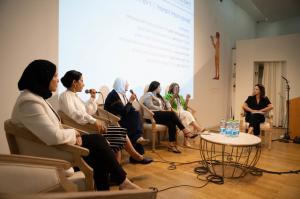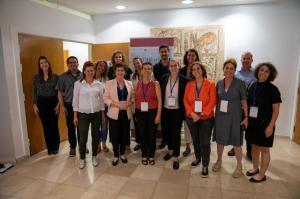A New Survey of Parents in Israel Reveals Attitudes to Early Childhood Education Frameworks
A New Survey of Parents in Israel Reveals Attitudes Frameworks: The Survey was Launched at the Second Annual Early Childhood Education Policy Conference
QIRYAT TIV ON, QIRYAT TIV ON, ISRAEL, July 12, 2023/EINPresswire.com/ -- A new survey conducted in Israel among parents of young children until the age of three reveals:
The majority of parents find it difficult to pay for their children's care.
More than half of them do not believe that the government's new program will improve the existing problems in early childhood education. Ninety percent of parents support improved working conditions for edu-carers.
The survey was conducted by the Roshnik Research Institute ahead of the conference, "Seeing the Newborn", the second annual policy conference for early childhood education in Israel, a joint initiative of the Israeli Institute for Early Childhood Education at Oranim College and the 121 Engine for Social Change organization, in partnership with the Beracha and Rashi Foundations.
The conference, held at the Bible Lands Museum in Jerusalem, included the participation of Deputy Minister of Finance Michal Waldiger, Knesset members Moshe (Kinley) Tor-Paz, Eli Dalal, Uriel Busso, Kati Shitrit, and Iman Hatib Yassin, senior professional staff from the Ministries of Finance and Education, and from the education departments from municipalities, experts from academia, representatives from civil society, directors of edu-care centers and early childhood education frameworks and parent organizations.
Three hundred fifty-four parents of young children until the age of three, which reflect a representative sample of the general public in Israel, responded to the survey that investigated what are their considerations in choosing an educational framework for their children, what is their level of satisfaction with existing frameworks and what do the parents think about the struggle of the edu-carers for improved working conditions.
Eighty-nine percent of the parents said that fees for their children's edu-care frameworks make their monthly expenses difficult and they have a hard time making the payments. The difficulty includes parents from all income levels and from diverse populations in Israel. In a similar survey we conducted last year, only 17% of the parents stated that the cost was a main consideration in choosing a framework for their children, whereas this year, the percentage rose to 41%. In practical terms, the financial consideration took precedence over all others, such as the relationship to the children (31%), proximity to home (24%), the quality of education and the professionalism of the staff (20%), and more. In looking at different population groups, the ultra-orthodox respondents said that the key consideration was the relationship to the children (52%) and the price (50%) and Arab respondents stated that the main consideration was safety and supervision (47%).
A few months before the beginning of the upcoming school year, 41% of the parents of young children said that they are still struggling to find a framework for their children. The biggest challenge is in finding a private framework – 48% of these parents still have not found a framework for the 2023-2024 school year. Among parents who are looking for subsidized frameworks, 29% have yet to find a solution.
More than half of the parents (56%) stated that they do not believe that the new government program of investment in early childhood education will improve the current situation. The government program aims to provide subsidies to certain groups of parents of children from birth to three, and to increase the number of edu-care frameworks supervised by the Ministry of Education. Above average wage-earners expressed a high percentage of mistrust (69%) in the program. Among ultra-orthodox parents, 53% believed in the government's new program. In addition, the vast majority of parents (90%) said that they support the edu-carers in their struggle for increased pay and improved working conditions.
Another interesting statistic was a certain decrease in parents' fears regarding abusive behavior by the edu-carers in early childhood frameworks. In the survey we conducted last year, approximately two-thirds of the parents expressed fear of situations in the centers that could endanger their children either physically or emotionally, whereas in the current survey, 51% expressed this fear – still a significant proportion.
Tali Nir, Director of 121 Engine for Social Change, that leads the partnership "In Good Hands", and includes dozens of educational and social NGOs that work to advance the investment in early childhood education stated, "The results of the survey point to the fact that parents view a need in strengthening and supporting edu-carers in order to ensure quality education for their young children. It is still not too late to change the program that the government presented and to invest the budget that was meant to subsidize parents' costs into a pay raise for the edu-carers. Investing in educators will advance much more the needed foundation for quality early childhood education."
Michal Cohen, Director of the Rashi Foundation and former Director of the Ministry of Education – "The early childhood educational framework plays a central role in forming the personality and development of the child, and the government should allow each parent to send their children to a supervised and regulated framework. We need to raise the pay for edu-carers and at the same time, create training programs that will improve the quality of the care and will create a professional career that will attract a quality workforce."
Dr. Orit Dror, Director of the Israeli Institute for Early Childhood Education, Oranim College – "The results of the survey point to the distress and the economic fear of parents of young children. The economic element became the central concern for choosing an educational framework. I assess that the inquiry into subsidized frameworks will grow, however, these frameworks have been starved for many years and find themselves in an acute crisis. Concurrently, there will be a growth in the trend of cheaper "pirate" frameworks that are unsupervised. Therefore, the demand of the government for quality, supervised and subsidized early childhood education needs to be heard even more strongly."
Tali Laufer
Oranim College
email us here
Legal Disclaimer:
EIN Presswire provides this news content "as is" without warranty of any kind. We do not accept any responsibility or liability for the accuracy, content, images, videos, licenses, completeness, legality, or reliability of the information contained in this article. If you have any complaints or copyright issues related to this article, kindly contact the author above.


